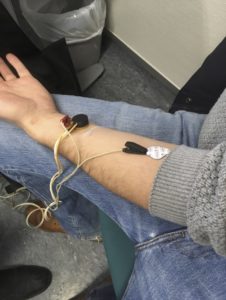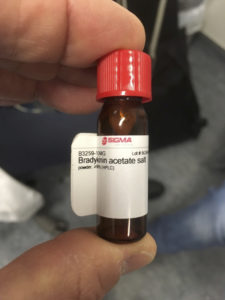
- Project belongs to the Topic:
- C1-inhibitor and Bradykinin
Description
Bradykinin is an important mediator in blood pressure regulation, ischemic precondition and capillary leakage, allergy, anaphylaxis, inflammation, and nociception, at least partly via the generation of nitric oxide (NO). Macrophages are particularly abundant in the porcine lung circulation. Upon bradykinin binding macrophages release cytokines and endothelial cells increase plasma leakage. Both cells produce NO. The complement, hemostatic, fibrinolytic and kinin plasma cascade systems crosstalk and interacts with many inflammatory systems. In the present study we investigated the effect of the shock induced by intravenously infused bradykinin on the cascade systems, cytokines, plasma leakage and exhaled NO in pigs. The metabolite of bradykinin, BK1-5, was measured in plasma by a sensitive, specific and reliable liquid chromatography-mass spectrometry method to verify exposure and in vivo metabolism of bradykinin. We show for the first time in vivo how bradykinin exposure induced shock and increased exhaled NO, activated complement and hemostasis and induced cytokine production and capillary leakage. The results broaden our understanding of how bradykinin activates endothelial cells and macrophages to induce shock and inflammation. Read More
We plan further studies!
Pain (Dolor) is central to Inflammation.

Bradykinin is considered an important mediator of pain. At least some of its effects are via transient receptor potential vanilloid 1 (TRPV1), a heat-sensitive ion channel (DOI).
We investigate the role of exogenously applied bradykinin in iontophoresis in various settings.


